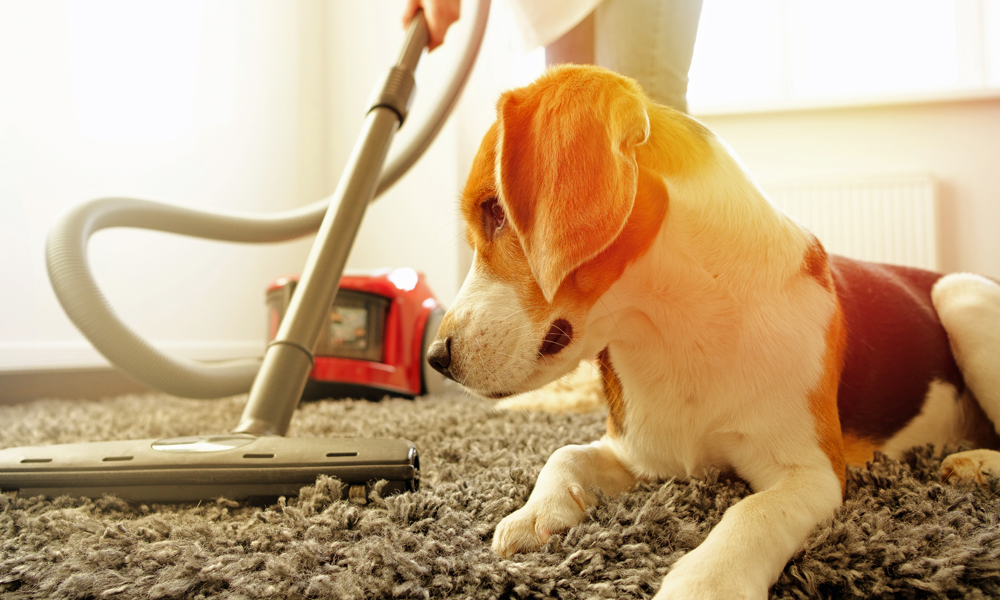As much as we love sharing our home with our beloved pets, pet odors can be an unfortunate side effect. We humans can get used to the scents that surround us. (The scientific term for this, we believe, is “nose blind.”) When you have pets, it can be difficult to have people over and feel confident that the air quality at your place is up to snuff.
To achieve the best of both worlds — the happy presence of pets and a home that smells pleasant — try some of these tips.
Top cleaning tips to eliminate dog and cat odors in the house
Clean litter boxes regularly
If you commit to scooping daily, you’ll make headway in reducing odors. Changing the litter twice weekly is the rule of thumb, but you can adjust that as needed. When you do, be sure to scrub the box with mild detergent. Cats tend to dislike citrus scents, and ammonia smells too much like their byproduct, so refrain from using these cleaning products scrubbing the cat box.
Regular vacuuming to collect dander and hair
At least once a week, vacuum all the floors to collect the dander and hair. Even if you have hardwood floors, a vacuum can collect tiny particles that a broom can leave behind. While you’re at it, use the vacuum attachment on the upholstery — including sofa cushions. If you’re in the market for a new vacuum, look for a model with HEPA filters. These are designed to trap tiny particles of dust, dander and other allergens.
By the way, a common complaint from pet parents is their trusty vacuum cleaners start smelling like dog. When it’s time for an upgrade, many models now come with odor-absorbing activated charcoal filters.
Designate pet blankets for furniture
If your dog likes snuggling with you on the couch, odors can be left behind on the upholstery and cushions over time. While deodorizing sprays can often do the trick, reserve a big towel or fleece blanket for your dog’s spot on the couch for him to lay on. This will protect your furniture and be easy to launder.
Launder pet beds
Over time, pet beds can become a repository of stank. That’s why you’ll want to insist upon a pet bed that comes with a thick removable cover so you can launder it every week. For stubborn odors in pet bedding, try a detergent that’s designed to attack odors. Or, use the soak cycle on your machine, adding a half cup of baking soda to the water, and allow to soak for several hours or overnight.
Freshen the air
Pet parents have their favorite air freshening products. Here are some to consider.
- Activated charcoal filters do a great job of soaking up bad odors from the air, rather than merely masking the scent. Just place them in a holder that applies with suction cups, and hang them near your pet’s crate and litter boxes. Like the classic box of baking soda, you’ll want to set a reminder to replace it every few months.
- An air filter tower, or even the small plug in air filters, can work wonders on your pet’s “stink zones.” Just avoid any air freshening products that produce ozone. Though marketed as air purifiers and deodorizers, ozone can actually be harmful for humans to breathe in, and more so for smaller creatures, including cats and dogs.
- Essential oil diffuses are popular, but according to the ASPCA Animal Poison Control Center, certain essential oils can actually be irritating or toxic to animals, especially cats, when they’re ingested or inhaled.
- Some pet parents favor Himalayan salt lamps, though there’s no evidence that these actually do anything to neutralize odors. Even so, the warm glow does provide a safe alternative to candles, if you crave the ambiance.
How to eliminate pet odors from carpet and upholstery
When accidents happen, they never seem to be anywhere near the hard kitchen floor. When carpeting, an area rug or a favorite comfy chair, are present, this is where the Murphy’s Law of pets kicks in. These accidents don’t always result in permanent damage to textiles, but one problem pet parents may face is lingering odors, even after doing their best to clean up the urine.
Many online articles will advise using baking soda, vinegar or hydrogen peroxide to clean and deodorize stinky areas. While they certainly won’t do any harm, they will not get to the root cause, and here’s why. Two odor causers in urine are urea and bacteria. Urea is the crystalline byproduct of protein metabolism, and when the bacteria comes in contact with that, the urea decomposes and the result is some truly funky odors.
To rid yourself of pet odors, use a cleaner that’s designed for the job, specifically, one with enzymes. What enzymes do is quickly break down urea and other substances, destroying the source of the odor.
When accidents happen, use enzyme cleaners on stained areas right away. They’re also effective on older stains.
Afterwards, if you are still dealing with pet odors, make sure you cleaned the underside of the rug or carpeting, along with the flooring and carpet padding. Shining a black light in a dark room can reveal any untreated areas.
How to eliminate pet odors from drywall
Unfortunately, pets aren’t always considerate, and they end up spraying the walls — whether it’s a litter box miss, or a territorial pet with a high aim. When this happens, rapid cleanup with an enzyme cleaner is a must. But when odors end up getting trapped in the drywall, a small home improvement project should fix the smelly issue.
One solution is applying a coat of stain-and-odor-sealing paint. These are designed to seal off surfaces that have been stained or contaminated with odors (including smoke damage and pet odors). Severely damaged drywall, on the other hand, should be replaced.
Defeating odors at the pet level
Now that your housekeeping is up to date, turn your attention to your pet themselves.
Regular baths and grooming
Regular bathing can keep your dog smelling fresh and clean. Read our blog to learn how to bathe your dog like a groomer and maintain a healthy coat.
Rule out medical issues
When older cats, for example, have medical issues such as arthritis, they can have trouble cleaning themselves, resulting in a smelly cat. For more on this, check out our guide to investigating the cause of cat odors and how to defeat them.
Spay and neuter your cat
Cats, particularly male cats, will spray urine to mark their territory. If your cat is not yet altered, taking him to the vet for this simple procedure can go a long way in calming this aggressive tendency. Not only will this make your home smell a whole lot better, you’ll also do your part to prevent unwanted kittens from entering the world.
Can diet eliminate pet odors?
An inferior diet can make pets stinker than they should be, which is a sign that they need something more digestible and gentler on the gut. Protein allergies or a sensitivity to a common filler ingredient like corn, soybeans or wheat can cause stomach upset and irritation, resulting in stinky breath, runny stools and excess gas. Read Why does my dog’s breath smell like fish?
Upgrading to a high-quality diet like NutriSource will stop intense odors where they start, and here’s how.
- We’re a family owned brand that uses high-quality, responsibly sourced proteins in all our formulas — and no corn, wheat or soybeans.
- Our cat and dog diets include an exclusive blend of supplements called Good For Life. These feature prebiotics, which is a special variety of non-dietary fiber that binds to the bad bacteria, so it can be easily and comfortably eliminated by your pet. These prebiotics also create an ideal environment in the gut for healthy bacteria called probiotics to thrive. A healthier gut means less gassiness and fresher breath.
- Our cat diets include yucca extract, which reduces feline fecal odors by 30-50%, leaving fewer unpleasant smells at the litter box.
Discover the NutriSource difference, and pick up a bag today at your local independent pet retailer.


